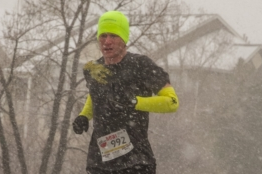New Olympic qualifying standards for track & field and the marathon were revealed, unleashing a torrent of opinions. These primarily revolve around the argument that the impact of the US Olympic trials has been lessened. Previously, entry times for the trials matched the Olympic baseline times and for runners who qualified for the trials, finishing in the top three guaranteed a spot on the team. For spectators, watching the trials meant seeing the team form based on the results. Now, that may not be the case.
In 2016, the Olympic and trials qualifying standard for the men’s marathon was 2:19. If a US runner qualified for the trials with a 2:18:59 and then finished third there with a 2:16:00, they would have lined up in Rio to make their attempt at a medal. The new men’s Olympic standard is 2:11:30. For an aspirant in the marathon, they can still run under 2:19:00 and make the US trials. However, if someone qualifies for those with a 2:14:00 personal best, runs a 2:11:35 at the trials on February 29, 2020, and they finish in the top three, they would either need to post a 2:11:29 between then and May of 2020, which is absurd, or hope their IAAF world ranking qualifies them.
Does this rule change matter for U.S. runners? Galen Rupp is the only current American athlete who has routinely posted marathon times that are under the new standard and that are within striking distance for podium finishes at major races. Since 1964, American male distance runners have earned 9 medals at the Olympics. This is out of 117 medals that were awarded (5000M, 10000M, and the marathon at all the Olympics from 1964-2016, but not including the 1980 summer games, which the United States boycotted). Given the current top times that many U.S. runners have posted, it’s possible they will earn more at the next Olympics, maybe even likely, but with the domination of African runners, adding more than three is unlikely.
Changing the standard to 2:11:30 (and lowering the times for the other distances) might affect the interest and importance of the trials, and it impacts any other runner in the world who would have qualified with a time in the former ranges, but it’s unlikely it drastically changes the probability of who will win medals. Do you only allow people in who are very likely to medal?
Doing so runs counter to the spirit of the sport. The Olympic trials represent an obtainable dream for a fair number of top distance runners. One could argue that for the 2024 games, the trials qualifying time could be changed to match the Olympic ones so that top three finishers still are guaranteed to make the team. But, you would only have a handful of runners out there, which isn’t as exciting for them or the sport. Also, a couple of relatively unknown women who were not at the top of the marathon world have won the trials in the past. While they probably had the race of their lives at the exact right moment, it’s those types of achievements that give other runners fuel.
Many people thrive on achievement and goals, whether it’s a world record in the marathon or completing a 5K. When you cut down on the ability of people to achieve goals and it’s not due to problems having developed under the former rules, it makes the sport more elitist. It’s not like the Olympics expanded the running field for the last summer games and dealt with major logistical issues because of it. Countries are limited to a certain number of athletes they can send and the field has not been bloated due to more and more people hitting their standard times. It’s been three runners per country for each event for a long time.
A 2:19 marathon still requires the athlete to run a 5:18 mile pace and there are a limited number of people out there who are capable of that. In the grand scheme of things, having the Olympic course open for an additional eight minutes or so to allow extra competitors is beneficial to the world running community. When Brazil hosted the 2016 Olympics, one of their stars would not have been able to participate under these new rules, and he is no slouch on the road.
American and other countries’ distance running programs are unlikely to yield the same caliber or number of elite athletes as Ethiopia, Kenya, and other African countries. Yet it serves no one to cut down on the number of current spots on the Olympic starting lines. The IAAF’s rationale, that it will encourage more runners to compete at their meets and improve their world rankings which will be used to help determine the Olympic teams, is sound. And, under that, the United States probably will still send a full roster of distance runners to the Olympics. Yet, there’s no guarantee that it will and the trials are less likely to serve as the final determinant of that roster. The new rules restrict qualification to an event that’s already highly selective. We’ll see what happens as we get closer to trials season.
Running food review of the week: (note–gels, bars, chews, and other items affect everyone differently. Try them on a short run before using them for a key training run or race): Gatorade Arctic Blitz: Some Gatorade drinks can be a little much to handle in the mornings. This one, part of their “Frost” line, bucks that trend and does it well. I’ve used it a few times for early morning runs and it fuels me and my GI feels good.
*Edited to include a new Gatorade review. The first posting contained a repeat review.
References used:
http://www.letsrun.com/news/2019/03/did-the-iaaf-just-kill-off-some-of-the-significance-of-the-olympic-trials-iaaf-announces-new-qualifying-system-entry-standards-for-2020-olympics/
https://en.wikipedia.org/wiki/1980_Summer_Olympics_boycott
https://en.wikipedia.org/wiki/5000_metres_at_the_Olympics
https://en.wikipedia.org/wiki/10,000_metres_at_the_Olympics
https://en.wikipedia.org/wiki/Marathons_at_the_Olympics
https://www.runnersworld.com/news/a25770488/2020-olympic-marathon-trials-field/
http://www.usatf.org/Events—Calendar/2020/U-S–Olympic-Team-Trials—Marathon/QualifyingStandards.aspx
https://www.iaaf.org/athletes/united-states/galen-rupp-196507
http://www.usatf.org/Events—Calendar/2016/U-S–Olympic-Team-Trials—Marathon/Qualifying-Standards.aspx
https://en.wikipedia.org/wiki/Athletics_at_the_2016_Summer_Olympics_%E2%80%93_Men%27s_marathon
https://www.chicagotribune.com/news/ct-xpm-2000-02-27-0002270286-story.html
https://www.washingtonpost.com/sports/olympics/many-of-brazils-top-marathoners-get-their-start-running-as-trash-collectors/2016/04/17/e9b3cc3a-fb37-11e5-80e4-c381214de1a3_story.html?noredirect=on&utm_term=.11edf2e88043
